How a 75-year-old Japanese volunteer, Fuminori Tsuchiko, lived with Kharkiv residents in the metro for six months and opened a free café in Kharkiv

Fuminori Tsuchiko is 75 years old. Almost a year ago, he moved from Tokyo to Kharkiv and has no plans to go back.
For about six months, Tsuchiko lived in the metro with residents of Kharkiv and helped them with food. And recently, together with his Kharkiv partner, he opened a café in Saltivka district, which has been damaged from constant attacks. Fuminori’s café prepares about 600 free meals a day for the townspeople.
Fumi doesn't speak Ukrainian and barely speaks English, but his actions speak louder than any words. Tsuchiko has many sympathisers in Ukraine and in his native Japan; the media adores the unusual volunteer, and the head of Kharkiv Oblast Military Administration calls him "one of the symbols of Kharkiv's invincibility".
Ukrainska Pravda went to Fuminori Tsuchiko's café and talked to him and those who have known him for a long time about his philosophy of life.
"Tastes just like home"
"My pension is small, but I want to eat. Onions and carrots cost what, 50 hryvnias [for one kilogram. That is approximately US$1.30]? When they started feeding us here, we started coming," a pensioner who does not want to give her name tells us in the line at the window of FuMi Caffe.
During the war, she moved to another district of the city, and two months ago she came back to her native Saltivka. She came here with her friend.
"The food here is good. It tastes just like home," she adds.
The number of people queuing up at the food distribution window is growing. Almost everyone here knows the owner, a volunteer from Japan, Fuminori Tsuchiko, or simply Fumi.
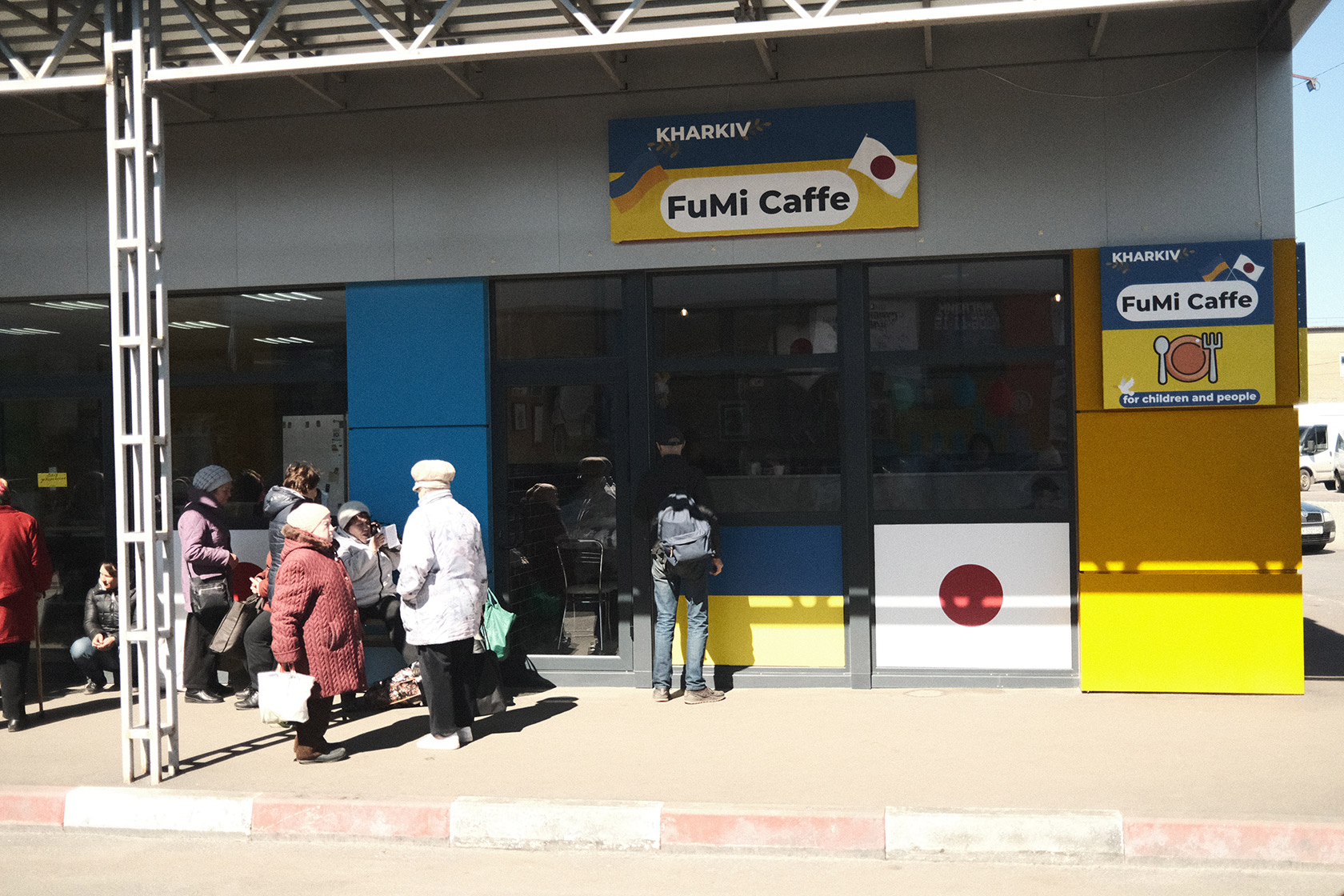
Fumi nods to us with a smile, as if we were old friends, and invites us inside the location that bears his name. He wears a hat with the image of a well-known postage stamp with a Russian warship on it.
There are pictures on the walls of the small room. One of them depicts a samurai, the other shows a man wearing glasses and sporting a samurai moustache and beard, who looks like the café owner. Both of them have the flags of Ukraine and Japan on them.
"The drawings were given to me by Sophie, who is 10 years old," says Fumi. "There are gifts from Ukrainian and Japanese children."
There is a photo of Fumi with a group of people around school chairs among the drawings.
"This is a school in Saltivka, where a lot of people were living, and I supported them. This was summer, it was very hot," he says.
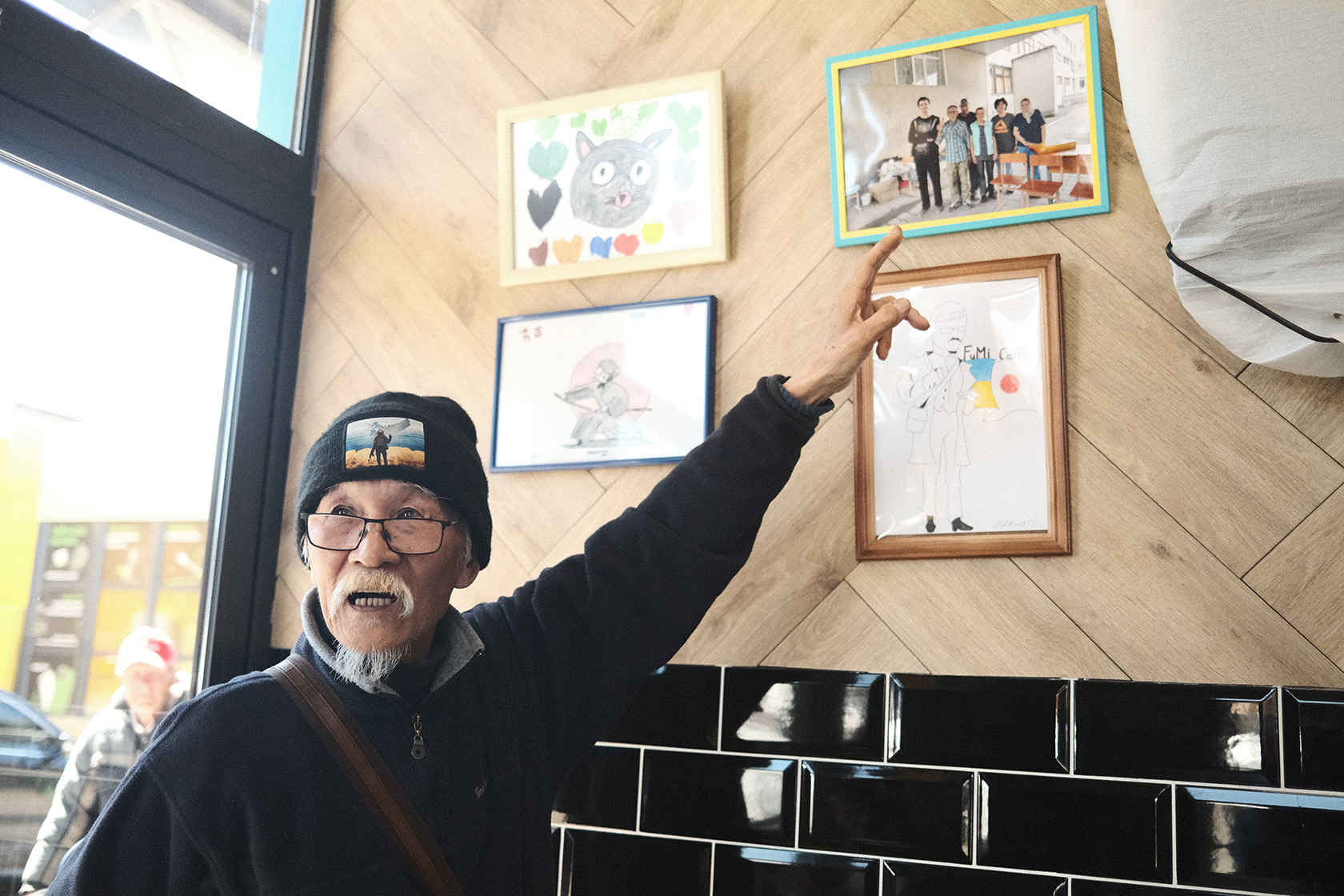
Meanwhile, activity in the next room is in full swing. One cook is transferring freshly cooked hot buns from the frying pan to a tray, while another is stirring salad in a large pot. In half an hour, at 12:00, free food will be served from the window of FuMi Caffe for three hours.
"I believed that everything would be fine, so I was not afraid"
Fuminori Tsuchiko was born in Tokyo. In Japan, he ran his own company, retired at the age of 60 and decided to explore the topic of Nazism, which he had been interested in since his youth.
"When I was 15, I watched a film about life in a Nazi concentration camp, where a large number of Jews were killed every day. I always wondered why people could kill so many," says Fumi.
"At university, I studied European history: Polish, German, French and the history of the USSR (Lenin, Trotsky, the October Revolution). I first went to Poland because I was interested in Nazi concentration and death camps. There was one Jewish concentration camp in Kyiv [Babyn Yar – ed.], and in January [last year] I went there," he explains.
On the eve of Russia's full-scale invasion, Fuminori was in Kyiv. Three days before the start of the full-scale war, representatives of the Japanese embassy asked him to leave Ukraine. Fumi left for Poland. However, he came back shortly after 24 February.
"In March, I went to Kyiv. On Maidan Nezalezhnosti [Square of Independence], I heard that many people were hiding in the metro in Kharkiv. I decided to come and help."
At the end of May, Tsuchiko finally reached Kharkiv. At that time, the contact line was about 15 kilometres from the city, and the occupiers were constantly and chaotically attacking it.
"I'm 75 years old anyway, so it doesn't matter when I die. I believed everything would be fine, so I wasn't afraid," Fumi recalls.
In June, Fumi met Nataliia Hrama, his future "partner in crime", at the Heroiv Pratsi [Heroes of Labour] station, the final metro station in the Saltivka residential area in Kharkiv, where several hundred people were sheltering. He started helping those hiding in the metro.
"When he saw so many Ukrainians crossing the border into Poland – children, old people sitting on the ground holding their grandchildren – he couldn't just watch and decided that something had to be done," Nataliia says.
"[Fumi chose Kharkiv] as he thought it was the most challenging place because there was a border with bad people nearby. He felt that if there were only a few people at this station [Heroiv Pratsi], he would return to Kyiv. But in the end, he found us.
He offered us his help and asked us what we needed. And we started working," she recalls.
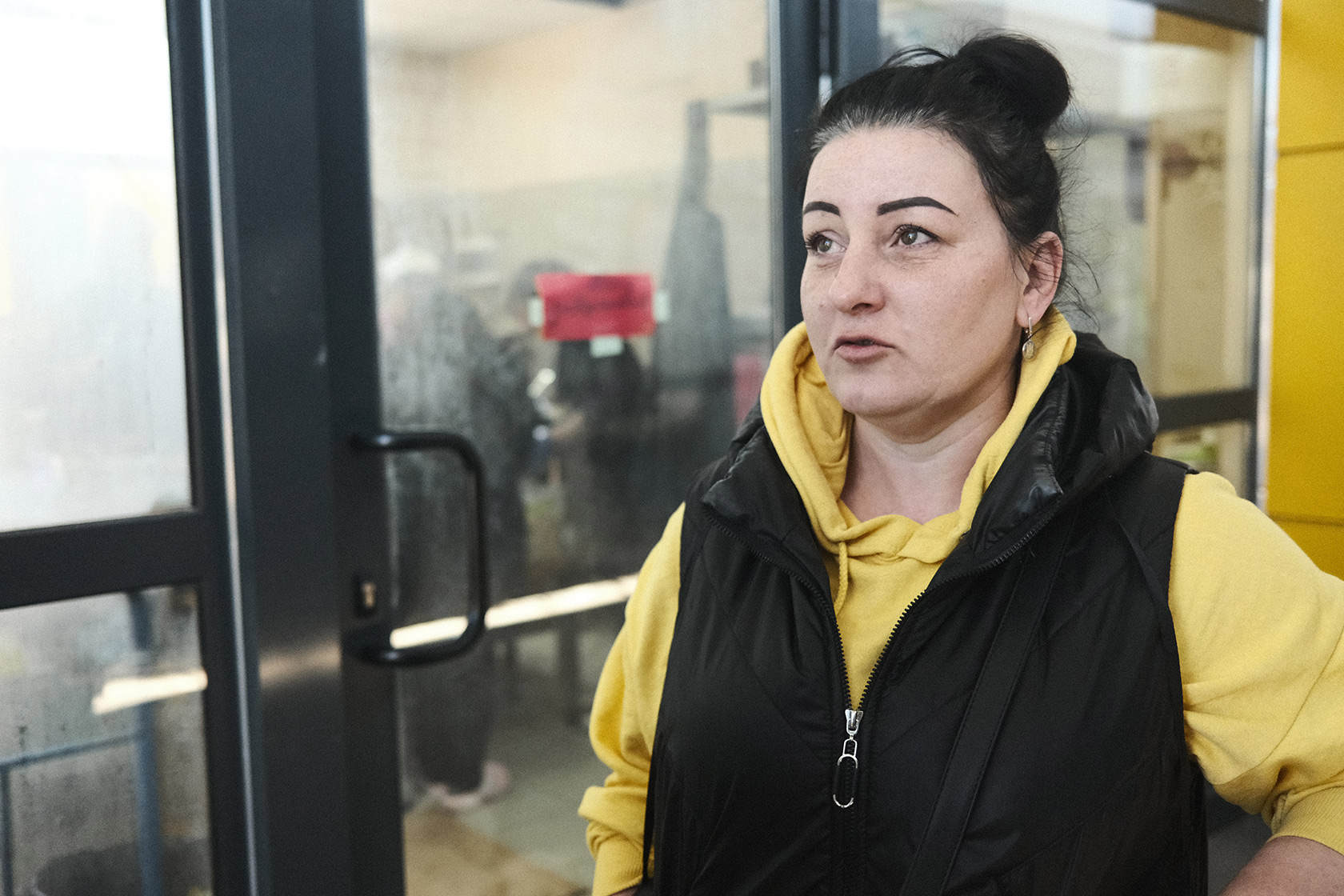
Fumi rented an apartment in Kharkiv for a month, regularly going down underground. And he started living in the metro on a regular basis in July.
"Everyone was surprised to learn that I was going to live there," he smiles, "and perhaps they thought I would leave soon."
Fumi was given a bunk bed near the security gates in the metro. He slept on the lower part of the bed and kept souvenirs with Ukrainian symbols on top. There, Fumi also met Yana Yevdokymova, who currently works in the kitchen at FuMi Caffe.
"Around 15:00-16:00, food prepared by local restaurants would be brought down to the metro. And Fumi said that people should have something to eat in the morning," says Yana. "We would buy food in the morning or the evening. Every morning, we served everyone Mivina noodles, tea, and sausages, and the children were given yoghurt, chocolate, and biscuits. We had a counter, and everyone came up and got their breakfast."
The table at FuMi Caffe features dolls with big eyes and boxes of children's toys dotted with Japanese characters. The volunteer also entertained children in the Kharkiv metro.
"I have two children; [Fumi] always played with them there. The children love him, now they come [here] after closing time," Yana says and points to the dog by the kitchen door: "Even my pet rushes to him. He loves this dog very much."
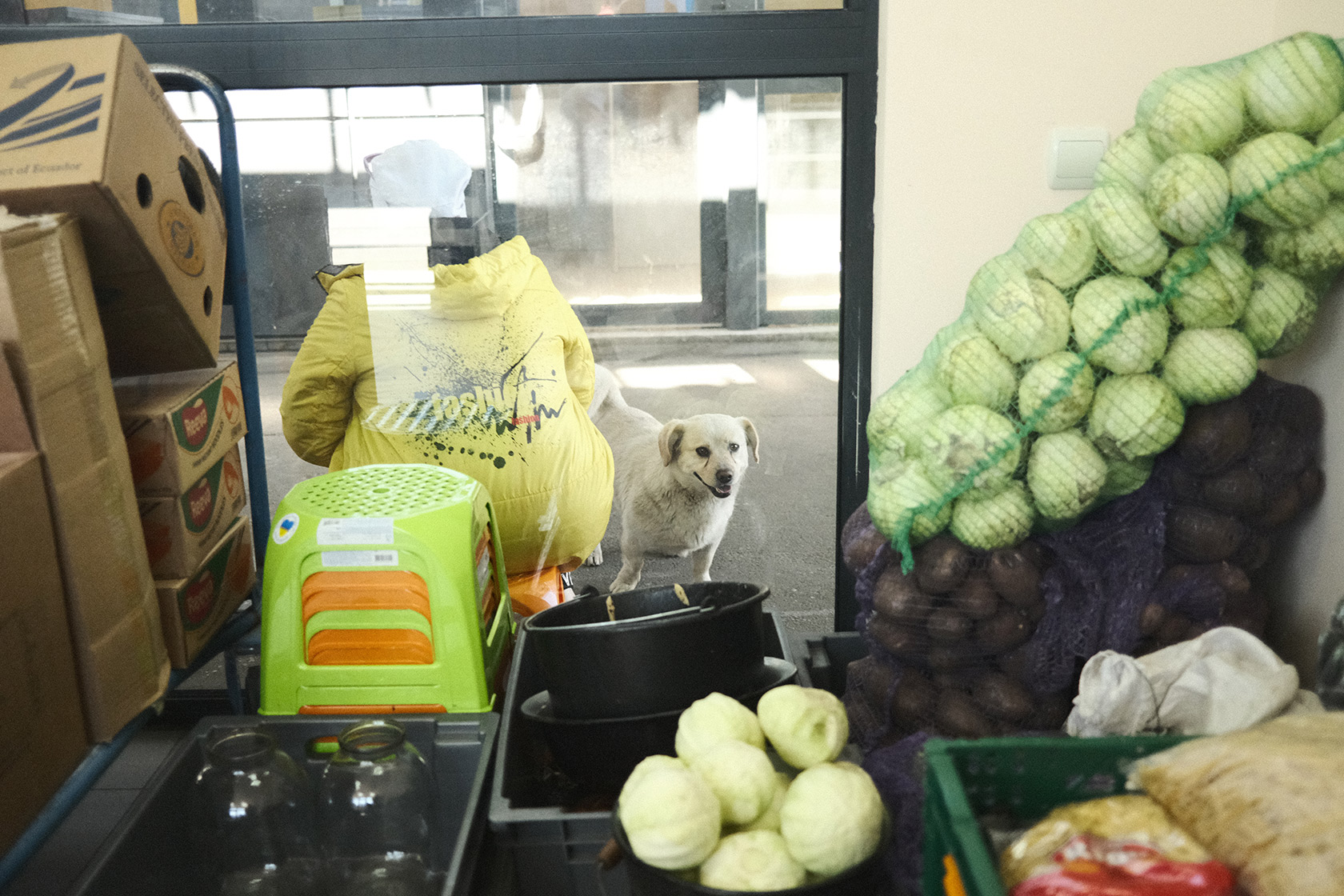
Fumi went to Japan on business in November after spending six months in the metro. He returned on Christmas Day, 24 December, and organised a party for those still living there. People, including Nataliia, were moved out of the metro the next day. Fumi kept helping the former residents of the metro.
"Fumi continued to support the people who had left the metro, giving them humanitarian packages every four days near the Fozzy supermarket on Heroiv Pratsi," recalls Nataliia, who lived in the metro for more than nine months.
"We started distributing milk and bread on Heroiv Pratsi and Studentska stations in February, and a month ago, we were giving out 1,000 meals a day. There were many people, and there was not even enough for everyone," she adds.
"Ukrainian cuisine is a few steps ahead of Japanese one"
The idea of opening a stationary facility to feed Kharkiv residents for free came to Fuminori in August. However, the city was still under regular bombardment before the Kharkiv counter-offensive by the Ukrainian forces, so the plans had to be put off.
Fumi and Nataliia eventually opened the café on 14 April near the familiar Heroiv Pratsi metro station. They chose Saltivka because of the severe destruction the area suffered and the many people in need.
"This year, I have enough money to go out into the world, so I decided to open a café," says Fumi. "[I opened it] for all Ukrainians. As the war drags on, people are exhausted, increasingly searching for food by digging through rubbish bins. I want to feed such people."
Natalia herself had worked as a chef in the restaurant business for 15 years. So, she invited some of the team to join her, using her old connections. Her colleagues agreed and quit their jobs.
"I hired half of the people because I trusted them and was sure they wouldn't let me down," she says. And I was right, they are worth their weight in gold. I am also satisfied with those who came in response to the advert."
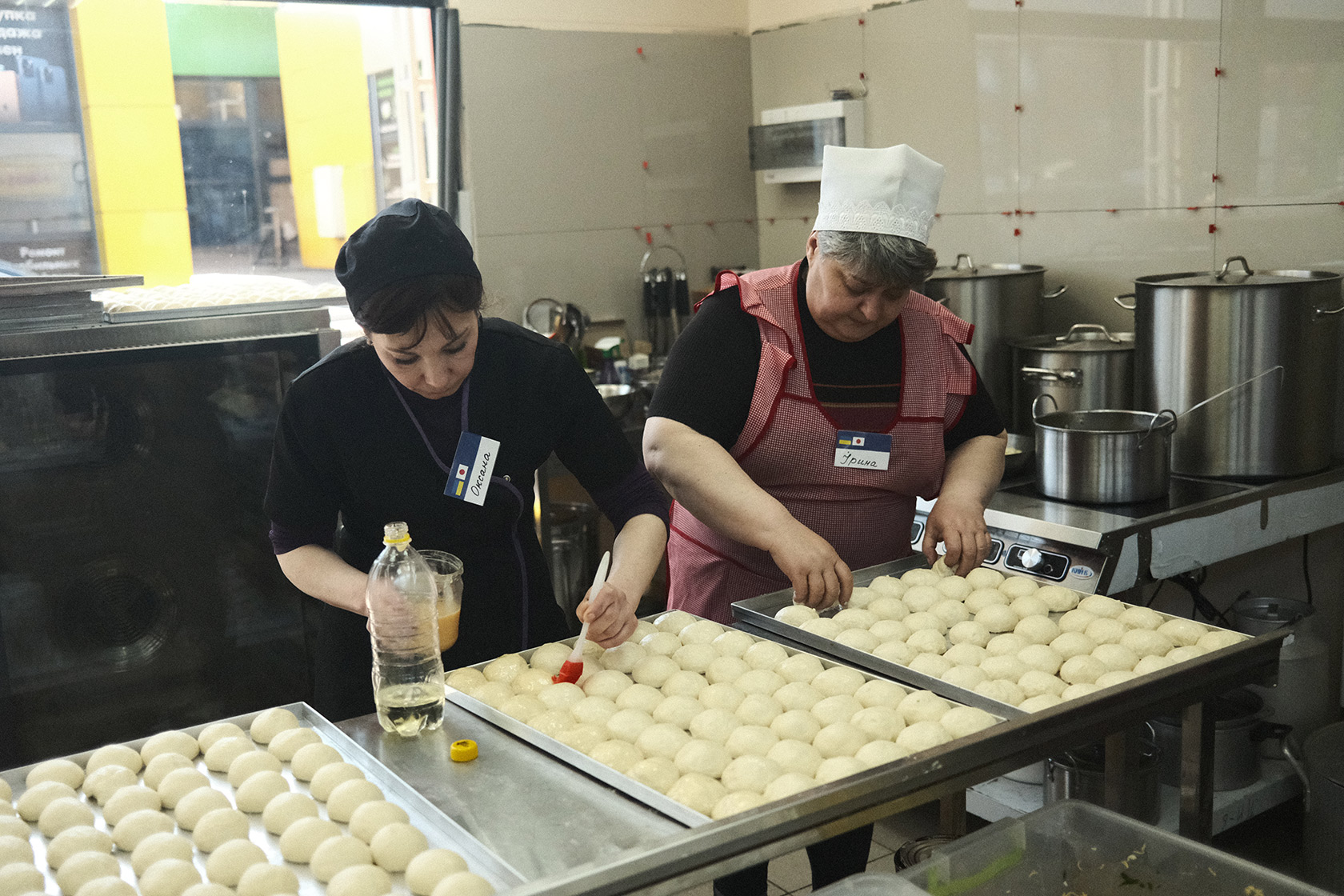
There are usually five people working on a shift: three in the kitchen and two in the distribution area. The staff are paid for their work.
"[The menu] always has a first course: we make borshch [soup made with red beetroots], soup, and rassolniks [soup made with pickled cucumbers, pearl barley, and pork or beef kidneys]," Natalia says. "The second course is always a dish composed of either gravy or meat, with a salad, tea, or compote [made by cooking fruit such as strawberries, apricots, peaches, apples, raspberries, rhubarb, plums, or sour cherries in a large volume of water, often together with sugar or raisins as additional sweeteners]. Our friends bring fruit, and grannies walk around with jars of canned food: "Please take this. We want to help!".
Fumi likes Ukrainian food.
"It’s what I like, and for me it's even a few notches above Japanese cuisine," he smiles, then names a few of his favourite dishes: "Borshch, potato pies."
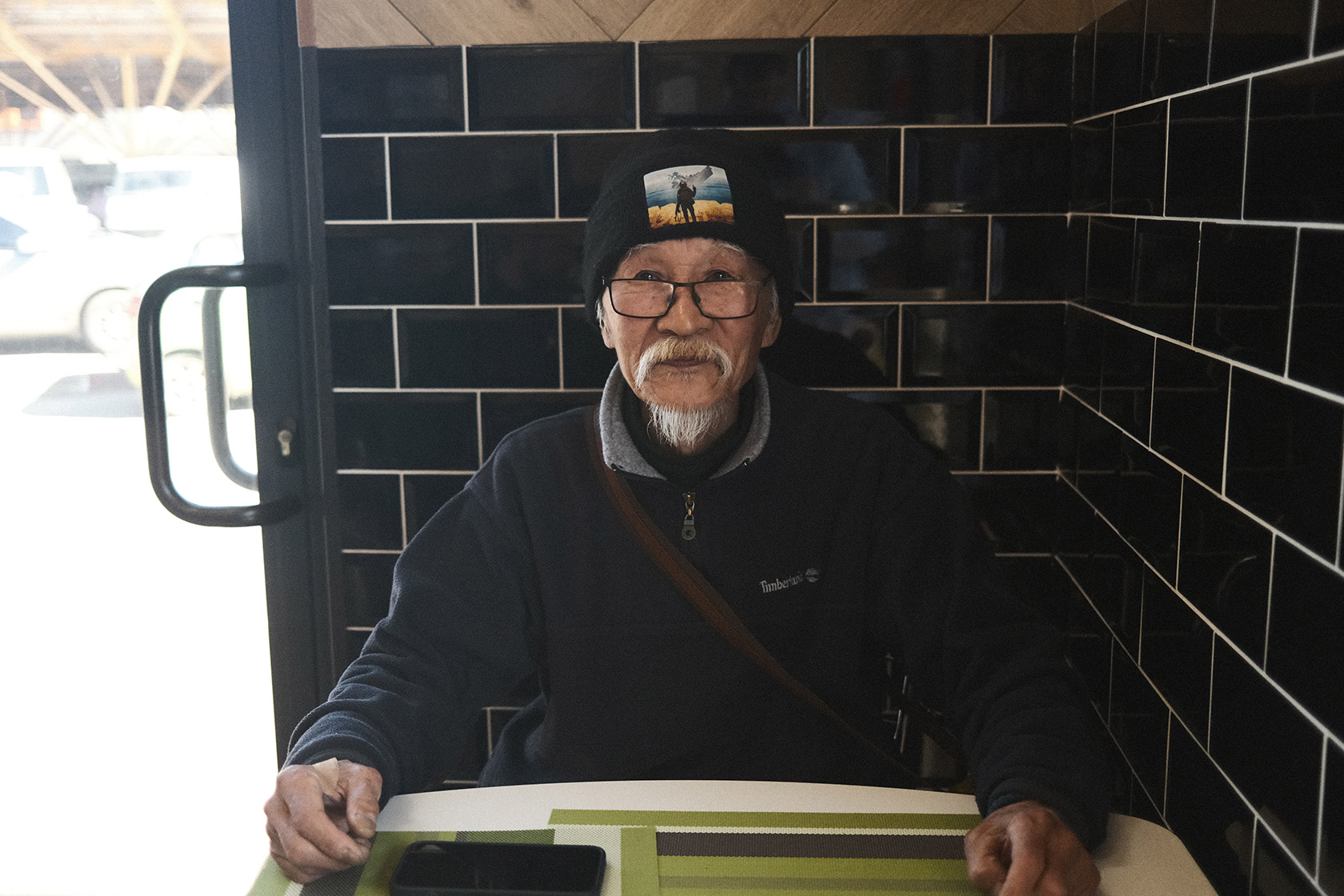
FuMi Caffe prepares around 600 meals a day. Nataliia says most of their customers can barely afford to eat and adds that neither she nor Fumi is afraid that people might abuse their kindness.
"This happens sometimes, but when I see someone crying as they eat their soup, I know why we keep doing this," she says. "Some of our customers, those with money, say: ‘We can afford to pay, but we’d like to try your food, so can we pay?’ We have a donation box to collect their contributions; this helps us in our work."
One of the walls is decorated with a copy of a Gustav Klimt painting, a patriotic landscape with sunflowers, and hieroglyphics written on countless blue and yellow pieces of paper.
"These are the names of our patrons and sponsors. Many people in Japan are sending me money," Fumi says and reads a few of the names out loud.
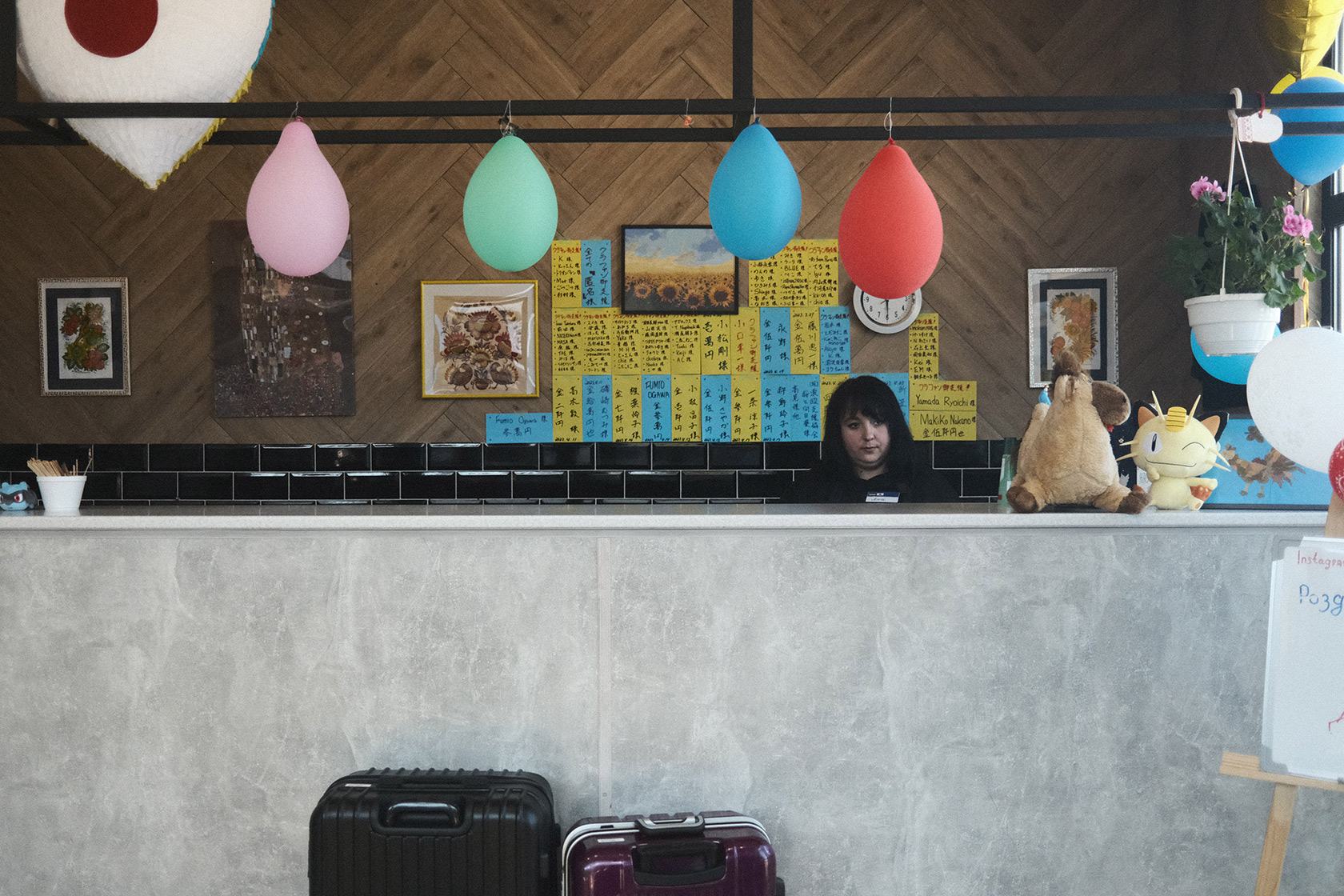
Nataliia stresses that not a single international organisation or fund has contributed to funding FuMi Caffe. In part, the cafe is funded by donations from Japan. Fumi is active on social media, reporting on what he does in Japanese to encourage the Japanese community to further support his endeavours.
"People are doing what they can to help, both business owners from Japan, and regular people," Nataliia says. "There is a [monthly] limit, but sometimes people give us more, and that means we have funds left over for the next month."
Other volunteers and Kharkiv residents have started to join and help. Some give money, some bring food. Nataliia recently set up a Fumi Fund (he could not do this himself because he is not registered as a resident of Ukraine) to be able to collect contributions to keep funding the café.
"Now we are friends, and we are doing this work together. We've been working together for almost a year now," she says.
"Donations from Japan have helped us open our doors, but we later realised that the Japanese money will not be enough to fund everything we were hoping to do, and that we need some reserve funds.
People from Japan continue to be the most active supporters in terms of financing. The fund has not yet received any large contributions."
Head of the Kharkiv Oblast Military Administration, Oleh Syniehubov, recently visited FuMi Caffe. He gave the café a freezer, a "substantial" amount of produce and groceries, and presented Fuminori with an award. Journalists are frequent visitors at the cafe. Fumi is amused by the attention.
"No one paid any attention to me when I was living in the metro," he says with a smile. "Now government officials come to visit and every media outlet is talking about FuMi Caffe, FuMi Caffe!"
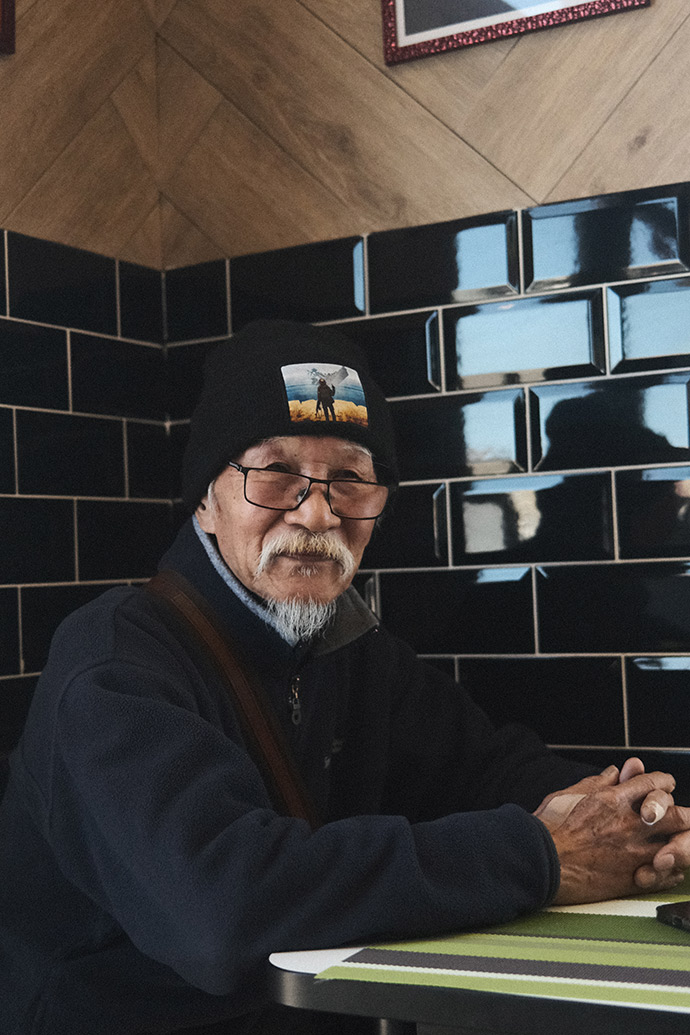
"Every café will offer food for free, so that everyone can eat"
Fuminori sold his house in Japan and is currently renting a flat in Saltivka. His wife died 15 years ago. His two daughters live in Japan, but he is not planning on going back.
Fumi used to travel a lot. He says that nowhere was he treated better than in Ukraine. He adds that "there are no major differences" between people in Ukraine and in Japan.
"I’m an illegal immigrant," Fumi says with a smile. "Many people in need of help come here [to his café - ed.]. I don't need to go back to Japan to help them. I will stay here until I die."
Fumi is hoping to set up a whole chain of FuMi cafes in Kharkiv. A new location is set to open near the Studentska metro station, and another one near the Barabashovo market.
"Every café will offer food for free, so that everyone can eat," he says.
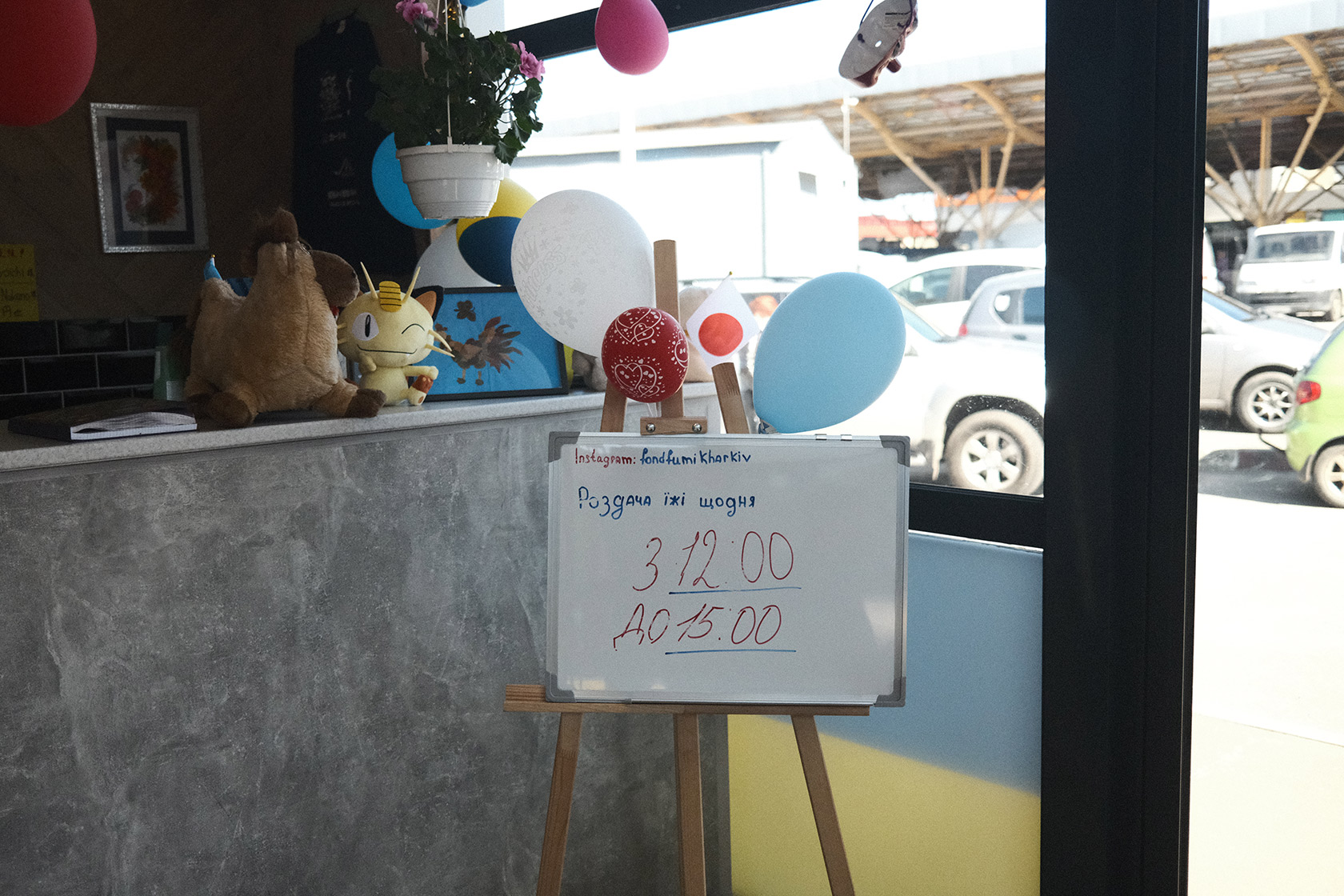
Nataliia is also renting an apartment in Saltivka. In September 2022, her husband was called up and joined the Armed Forces of Ukraine. For the last three weeks, he has been fighting in Bakhmut.
Nataliia and Fumi use a translation app on their mobile phones to communicate, but she says that having spent all this time together, they are able to "just understand" one another. Fumi is also making efforts to learn Ukrainian:
"For now I can only remember two or three Ukrainian words, but I think that in three years’ time you’ll be able to understand me, no problem."
Dmytro Kuzubov, photographs Kyrylo Honchar
Translation: Myroslava Zavadska, Artem Yakymyshyn and Olya Loza
Editing: Monica Sandor
